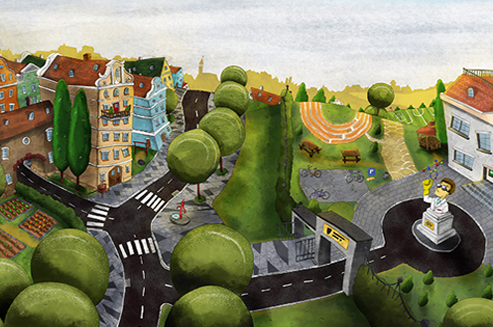As research of Matilde Irigoyen, MD, of Albert Einstein Medical Center shows, as much as 97% of households are equipped with a TV set, 83% have a tablet and 77% have a smartphone. As can be seen, it is not strange that such characteristics of children’s surroundings affect their behaviours. According to the specialist, 20% of infants have their own tablet and 28% of two-year-olds can independently navigate a mobile device without adult’s help. Although allowing such a little child to regularly come in contact with electronic entertainment may raise doubts, the positive influence on the development of older children’s competence is being mentioned more and more frequently. However, it is important to control the time spent on games and to select appropriate applications. Which of them work best?
On-screen search
The educational value of such activities has been scrutinised by scientists led by Michael D. Patterson of Nanyang Technological University who specialises in cognitive psychology and neurobiology. The subjects were using smartphones and tablets to play action, memory and spatial puzzle games, jigsaws requiring connecting 3 elements, simulations in which characters controlled by the user mimic real people’s activities and so-called hidden object games which consist in searching for items indicated in instructions. They were asked to perform several tasks aimed at verifying their cognitive competence before, during and after their contact with aforementioned entertainment. It is interesting that activities such as collecting items, memory puzzles and hidden object game activities affected the ability to visually search for objects and spatial memory.
“Mechanisms used in such applications which are addressed to children frequently require not only finding a particular item in the picture displayed on the screen, but also solving a greater mystery, in case of which the search for particular items is but a stage of the game” – explained Marek Guzowski, the CEO of Splendid Stories, the producer of the Detective Jolly Head Street of Secrets application. “By assuming the role of a detective, analysing evidence or interrogating suspects, the child is not only able to develop perception, but also stimulate imagination”– Guzowski added.
When selecting “hidden object” applications you should verify whether they refer to environment which is familiar for the child, such as home, school or popular locations for playing, which can further motivate the child to search for new stimuli nearby.
Responsible tablet use 101
The safe use of mobile devices by the youngest players is very much affected by controlling the time they spend playing games. Specialists from the American Academy of Pediatrics recommend that the time spent on games should not exceed 30 minutes or 2 hours, depending on the child’s age. Parents who think that they may have problems monitoring the time their children spend playing on their own can use recommended applications equipped with a lock function. Such mechanisms automatically display a message on the screen suggesting a break after a certain amount of time. That way the risk of the child sitting for many hours in front of a tablet, which is tiring for the child’s eyes, is eliminated. The child also learns that electronic entertainment should not fill most of the day and that it should rather be considered as a way to diversify it.
“The use of applications does not necessarily have to have a negative influence on the quality of the child’s leisure time. It is the opposite—they can inspire them to undertake various activities in the real world”, suggests Marek Guzowski. “The Family Friendly function is one of the measures aiming to help to do so—it is a collection of ideas for creative entertainment for children who can be accompanied by their parents or peers, such as playing in the kitchen or reusing old clothes, which can be done during a break from the game” – added the producer of the Detective Jolly Head Street of Secrets application.
From the virtual to the real world
The conventional hide and seek game can be considered as an alternative to aforementioned games, which also refers to characteristic features of “hidden object” applications. Its benefits are mostly compatible with positive influence on children’s development which is offered by electronic entertainment. The need to find a person hiding within a certain area helps them develop analytical and problem-solving skills. While teaching children to conscientiously use mobile devices, it is advisable to determine the time that the child may devote to playing on a tablet or smartphone and encourage the child afterwards to perform similar searches in actual places inspired by locations shown in the game or hiding items connected with the theme of their favourite application in the child’s room or near your home. It can be considered as an interesting diversification of free time, which is an excellent way to balance out digital and real world entertainment.
Read also:
Detective Jolly Head Street of Secrets – a new application for children
Graphics © Splendid Stories – Detective Jolly Head Street of Secrets application.



